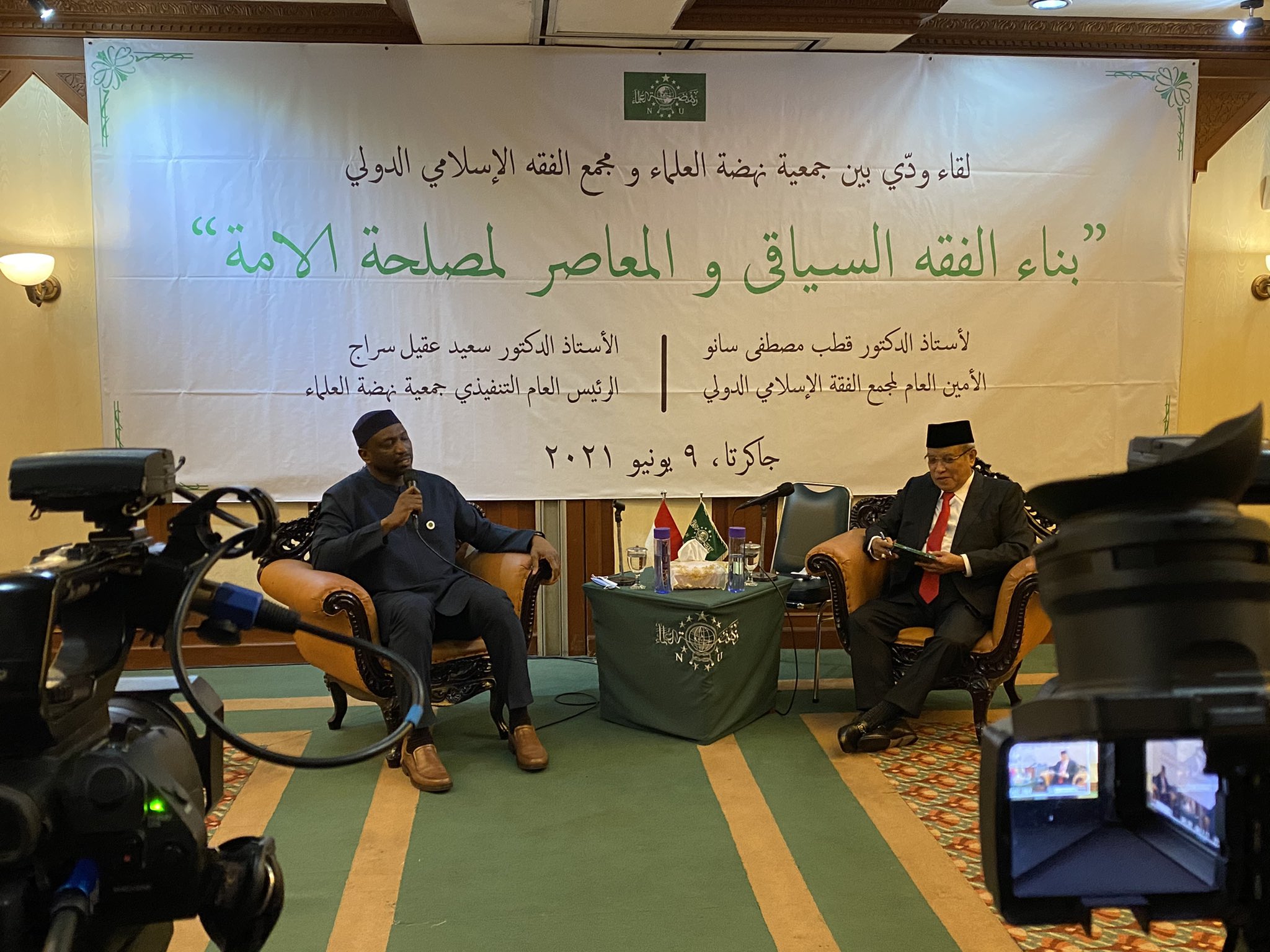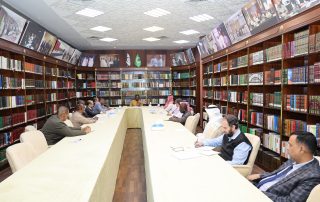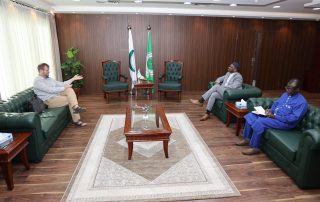
H.E. Prof. Saeed Aqil Siraj, Executive President of the Indonesian Nahdlatul Ulama Society, received H.E. Prof. Koutoub Moustapha Sano, Secretary General of the Academy, on Wednesday 28 Shawal 1442, corresponding to 9 June 2021, at the Society’s headquarters in Jakarta.
His Eminence, the Executive President of Nahdlatul Ulama, expressed his deep thanks and appreciation to His Excellency for his visit and his generous approval to give a public lecture on “the Structure of Contextual and Contemporary Jurisprudence”, commending in this regard the academic position of His Excellency among those who have known him closely or read some of his books on Ijtihad, Ifta and Islamic finance. His Eminence also assured His Excellency that Nahdlatul Ulama adopts an approach of moderation and temperance in Ijtihad and ifta; and rejects all forms of extremism and terrorism. He also highlighted the achievements of the Society, which is the largest Islamic association in the world, with more than 20,000 institutes, dozens of universities, hospitals, rehabilitation, and training centers throughout the Republic of Indonesia, which is a home of 300 million citizens, of which nearly 90% are Muslims.
His Eminence concluded his speech by expressing the Society’s willingness to cooperate and establish partnerships with the Academy, especially concerning raising the scientific and intellectual level of the Fatwa and the Advisory Committee within the association. Then, His Eminence opened the floor for His Excellency to give the public lecture on the Structure of Contextual and Contemporary Jurisprudence and its Benefit on the Ummah. He told His Excellency that between 15 and 20 million people were listening to his lecture via the Society’s television and social networks.
For his part, the Secretary General of the Academy expressed his profound thanks and appreciation for the warm welcome and hospitality and praised the outstanding scientific efforts and remarkable practical achievements that the Society has made and continues to make since its foundation nearly a hundred years ago. His Excellency also congratulated the Executive Director and the Executive Council members for their keen interest in education and purification, which have had the most significant impact on preserving the Islamic identity in the Indonesian archipelago, which counts more than seven thousand islands. His Excellency presented a brief overview of the Academy, its history, vision, mission, and objectives, and endorsed cooperation and coordination with the Society, especially in promoting moderation, Ijtihad, and Ifta on contemporary calamities and developments.
His Excellency, then, started by presenting the lecture’s terminology, which discussed the importance for the faqih (Muslim jurist) to drain his scientific and intellectual energy to achieve a solid, flexible, and consistent understanding of legal texts. His Excellency also explained that one of the most important characteristics of Shariah is that of the flexibility, capacity, comprehensiveness, and stability and that these characteristics as a whole confirm the eternal nature of Shariah and its applicability for every time and place. In other words, without the flexibility of the texts of the Shariah and the breadth of its provisions, it would not have the strength today to explain legal provisions suitable for the issues and problems of contemporary life.
Thus, Islamic jurisprudence, which is an authentic understanding of Shariah texts, is contextual jurisprudence based on the consideration of contexts, clues, and signs. It is a realistic jurisprudence as it is based on an accurate understanding of the texts and a sober recognition of the facts to choose the ruling appropriate for each incident according to time and place. This jurisprudence is characterized by avoiding the abandonment of ready-made rulings affected by time and place on facts that differ in time and place. This jurisprudence also aims to prevent the importation of fatwas intended to be used in different events and different realities and environments. Moreover, His Excellency pointed out that there are fixed rulings that do not change with time and place and are characterized by being stated in definitive texts in terms of significance and proofs, known as the fundamentals and constants on which all Muslims agree. His Excellency called for not neglecting these rulings under the pretext of revivalism and Ijtihad, as they do not require a new Ijtihad for understanding for their clarity and plainness, and which also include the foundations of belief, the pillars of Islam, the pillars of faith and Ihsan, the virtues, and boundaries and higher purposes of Shariah.
His Excellency concluded his lecture by inviting the Nahdtul Ulama Society to move forward by pursuing their emphasis on education, learning and purification, describing these three as the safety valve, the basis of stability, and ensuring progress and development at all times and places.
Read Also
Lastest








